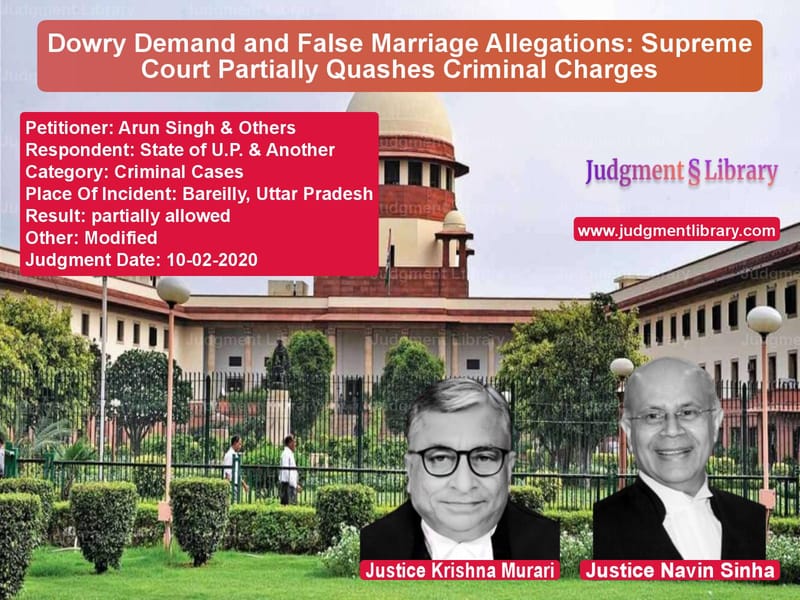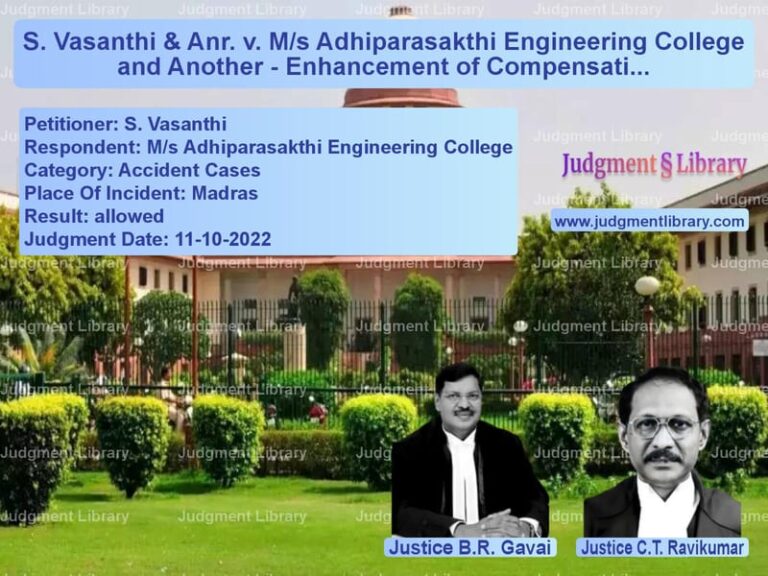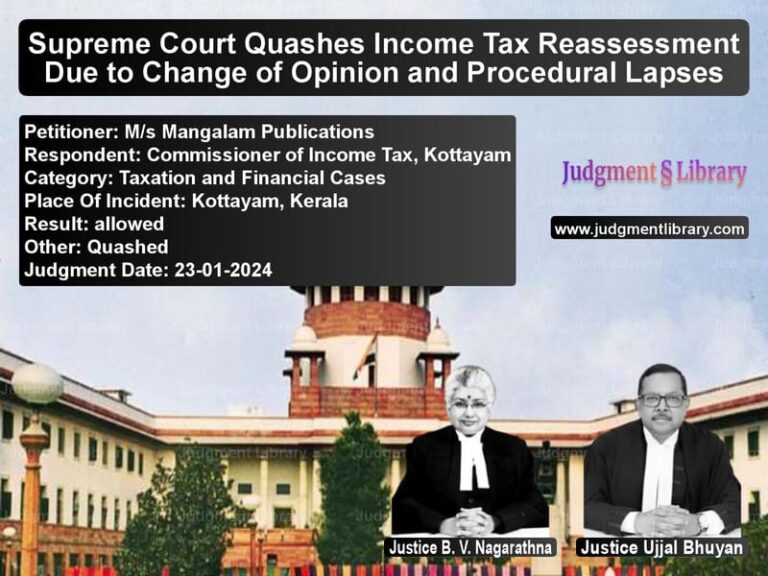Dowry Demand and False Marriage Allegations: Supreme Court Partially Quashes Criminal Charges
The case of Arun Singh & Others v. State of U.P. & Another revolves around allegations of dowry demand and deceitful inducement into marriage. The Supreme Court was tasked with determining whether the criminal charges filed against the appellants should be quashed under Section 482 of the Criminal Procedure Code (CrPC). This ruling clarifies legal principles surrounding false promises of marriage, dowry-related accusations, and the scope of judicial interference in criminal proceedings.
Background of the Case
The dispute began when the complainant filed a First Information Report (FIR) at Police Station Izzat Nagar, Bareilly, Uttar Pradesh, under Section 493 of the Indian Penal Code (IPC) and Sections 3 and 4 of the Dowry Prohibition Act. The complainant alleged that the appellant, Arun Singh, and his family initially agreed to his daughter’s marriage with Arun Singh but later reneged on the agreement while demanding a dowry of Rs. 5 lakh.
The complainant further alleged that, after the engagement ceremony, Arun Singh frequently visited his daughter and, under the pretext that the marriage was final, convinced her to enter into a physical relationship. However, when the complainant refused to meet the dowry demand, the engagement was called off, and Arun Singh married another woman. The complainant also claimed that despite making complaints to the police earlier, no action was taken, leading to the eventual filing of the FIR.
The police investigated the case and filed a charge sheet against the appellants. The appellants then approached the Allahabad High Court, seeking quashing of the charge sheet under Section 482 CrPC. The High Court dismissed their petition, prompting them to appeal to the Supreme Court.
Legal Issues Involved
- Whether the allegations in the FIR constituted an offense under Section 493 IPC (cohabitation caused by deceitful inducement into marriage).
- Whether the demand for dowry constituted a valid criminal charge under Sections 3 and 4 of the Dowry Prohibition Act.
- Whether the High Court erred in dismissing the petition under Section 482 CrPC without assessing the prima facie validity of the allegations.
Petitioners’ Arguments
The appellants, represented by their legal counsel, argued:
- The FIR was filed ten months after an initial compromise was reached between the parties, making the criminal allegations an afterthought.
- The allegations did not establish a case under Section 493 IPC because there was no evidence that the woman was misled into believing she was legally married.
- The complainant had earlier agreed to share the wedding expenses equally but later refused and instead made demands of Rs. 10 lakh from the appellant.
- The charge sheet should be quashed because the allegations did not meet the legal standard required for prosecuting the offenses.
Respondents’ Arguments
The respondents, including the complainant, countered:
- The offense under Section 493 IPC and Sections 3 and 4 of the Dowry Prohibition Act were non-compoundable and could not be compromised.
- The investigation confirmed that the accused had induced the complainant’s daughter into a physical relationship under false pretenses.
- There was a clear demand for dowry, which warranted criminal prosecution.
- The High Court correctly dismissed the petition since the allegations in the FIR were substantiated by evidence.
Supreme Court’s Analysis
The Supreme Court examined the legal provisions and previous judgments related to the offenses charged against the appellants. Key observations included:
- Section 493 IPC requires proof that the accused deceitfully caused a woman to believe she was lawfully married to him and, as a result, cohabited with him.
- The FIR did not contain sufficient allegations to establish that the complainant’s daughter was made to believe she was lawfully married to Arun Singh.
- While false promises of marriage leading to sexual relations could constitute other offenses, they do not necessarily fall under Section 493 IPC unless there is a direct misrepresentation of lawful marriage.
- The allegations regarding dowry demand were specific and clear, establishing a prima facie case under Sections 3 and 4 of the Dowry Prohibition Act.
Final Judgment
The Supreme Court ruled:
- The charge under Section 493 IPC was quashed, as the FIR failed to establish the essential ingredients of the offense.
- The charges under Sections 3 and 4 of the Dowry Prohibition Act were upheld, as there were clear allegations of a demand for Rs. 5 lakh.
- The trial for the dowry-related charges would continue in the trial court.
- The High Court’s decision to reject the Section 482 CrPC petition was modified accordingly.
Impact of the Judgment
This ruling has significant implications for criminal law and matrimonial disputes:
- It clarifies the legal threshold for invoking Section 493 IPC and prevents its misuse.
- It upholds the importance of evidence in proving dowry-related offenses.
- It reinforces that courts must carefully evaluate FIR allegations before proceeding with a criminal trial.
- It protects individuals from false allegations while ensuring that genuine dowry-related offenses are prosecuted.
The judgment balances the need to prevent abuse of criminal law with the necessity of punishing genuine offenses related to dowry demands.
Petitioner Name: Arun Singh & Others.Respondent Name: State of U.P. & Another.Judgment By: Justice Krishna Murari, Justice Navin Sinha.Place Of Incident: Bareilly, Uttar Pradesh.Judgment Date: 10-02-2020.
Don’t miss out on the full details! Download the complete judgment in PDF format below and gain valuable insights instantly!
Download Judgment: Arun Singh & Others vs State of U.P. & Anot Supreme Court of India Judgment Dated 10-02-2020.pdf
Direct Downlaod Judgment: Direct downlaod this Judgment
See all petitions in Dowry Cases
See all petitions in Fraud and Forgery
See all petitions in Judgment by Krishna Murari
See all petitions in Judgment by Navin Sinha
See all petitions in partially allowed
See all petitions in Modified
See all petitions in supreme court of India judgments February 2020
See all petitions in 2020 judgments
See all posts in Criminal Cases Category
See all allowed petitions in Criminal Cases Category
See all Dismissed petitions in Criminal Cases Category
See all partially allowed petitions in Criminal Cases Category







